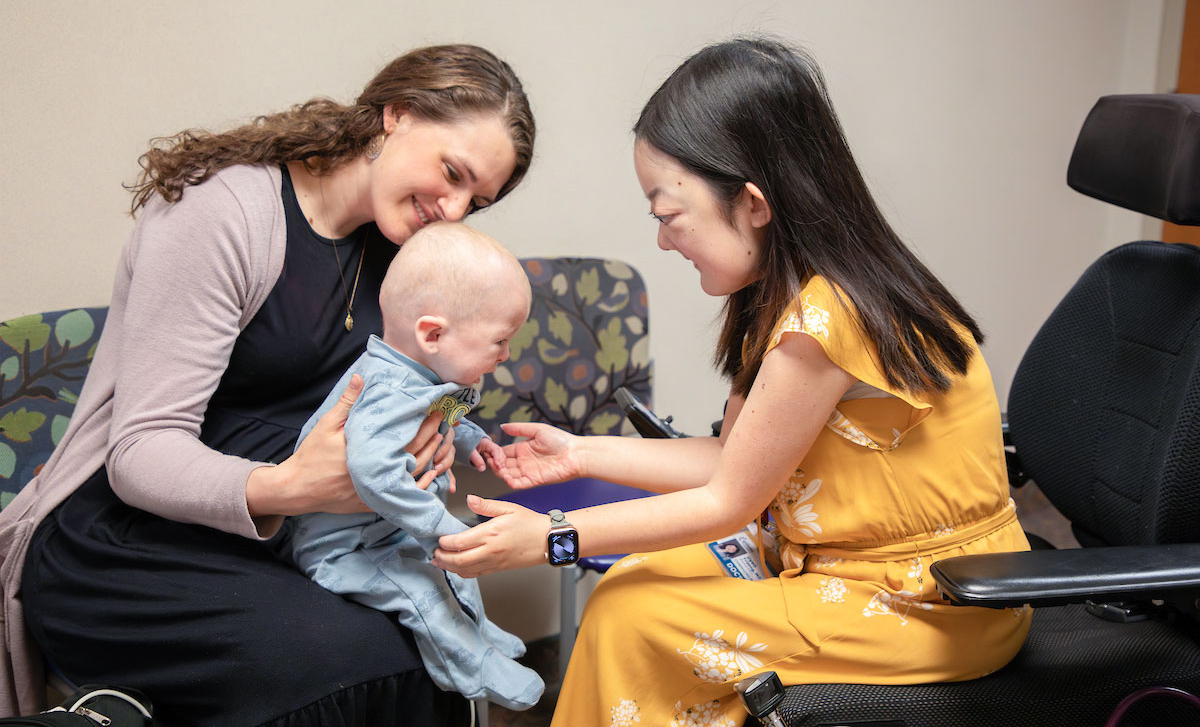Which rare diseases does Gillette Children's treat?
Gillette is known worldwide for its expertise in caring for children diagnosed with rare diseases. At Gillette Children's, we value each patient and their quality of life. That’s why medical research and finding answers to complex medical questions are a key part of our mission. Through clinical trials, the Gillette team of clinical scientists works with respected medical institutions around the world to improve outcomes for rare diseases that include:
Acute flaccid myelitis (AFM) is a rare but serious condition that affects the nervous system. AFM happens when swelling in the spinal cord causes the muscles and reflexes in the body to become weak.
Apert syndrome is a genetic disorder that can affect how a baby’s head, face, hands and feet look and work.
Charcot-Marie-Tooth (CMT) disease is a group of neuromuscular disorders that damage nerves in the legs and arms (also known as the peripheral nerves). CMT disease usually affects the nerves that control movement and sensation. It also affects cells that support and protect nerves. As a result, muscle tissue begins to waste and weaken.
Chiari (kee-AH-ree) malformation occurs when the back of the brain develops abnormally and pushes into the spinal canal. The downward movement of the brain tissue puts pressure on the cerebellum. This pressure limits the flow of the protective liquid (cerebrospinal fluid) that surrounds the brain and spinal cord. The pressure on the cerebellum can prevent parts of the brain and spine from functioning properly. It sometimes causes problems with balance and coordination.
Duchenne (due-SHEN) muscular dystrophy is a genetic neuromuscular disorder that causes progressive muscle loss and weakness. These symptoms lead to serious medical problems, especially with the heart and lungs. The condition mostly affects males.
Legg-Calvé-Perthes disease (also known as Perthes) is a condition in which the blood supply to the hip bone is temporarily interrupted, causing the bone in the hip to deteriorate.
Prader-Willi syndrome is a rare genetic disorder that affects growth, metabolism, appetite, behavior and overall development. Children who have Prader-Willi syndrome have weak muscles, short stature, incomplete sexual development and chronic feelings of hunger.
Neuromuscular disorders affect the nerves, especially those outside the brain and spinal cord (peripheral nerves). They also affect skeletal muscles, such as those in the trunk, arms and legs. These disorders can be stable and unchanging (static), or can grow worse over time (progressive).
Osteogenesis imperfecta (also known as brittle bone disease or OI) is a genetic condition that causes a defect in a protein found in bones—called collagen. The defect leads to fragile bones that can break easily. It is a lifelong condition that varies greatly in severity, affecting bone quality and bone mass.
Rett syndrome (also called Rett disorder) is a rare neurodevelopmental disorder that affects brain growth and development. It starts in childhood, almost exclusively in girls. Its effects on brain development can affect areas such as muscle growth, walking and communication. Gillette is just one of 15 clinics designated as a Clinical research Center of Excellence by the International Rett Syndrome Foundation (IRSF) in the United States.
Spina bifida is a group of congenital disabilities (a disability that is present at birth) that affects the spine. A baby who has the most severe form of spina bifida will be born with part of the spinal cord outside the body. Mild spina bifida might not cause symptoms.
SMA is a condition affecting the motor nerves that control muscular function. SMA makes activities such as crawling, walking, breathing and eating difficult for children. The nerves affected by SMA don’t have enough of an important protein, so they can’t carry signals from the brain to the muscles. Without those signals, muscles weaken and decrease in mass (also known as atrophy).
 Home Page
Home Page

